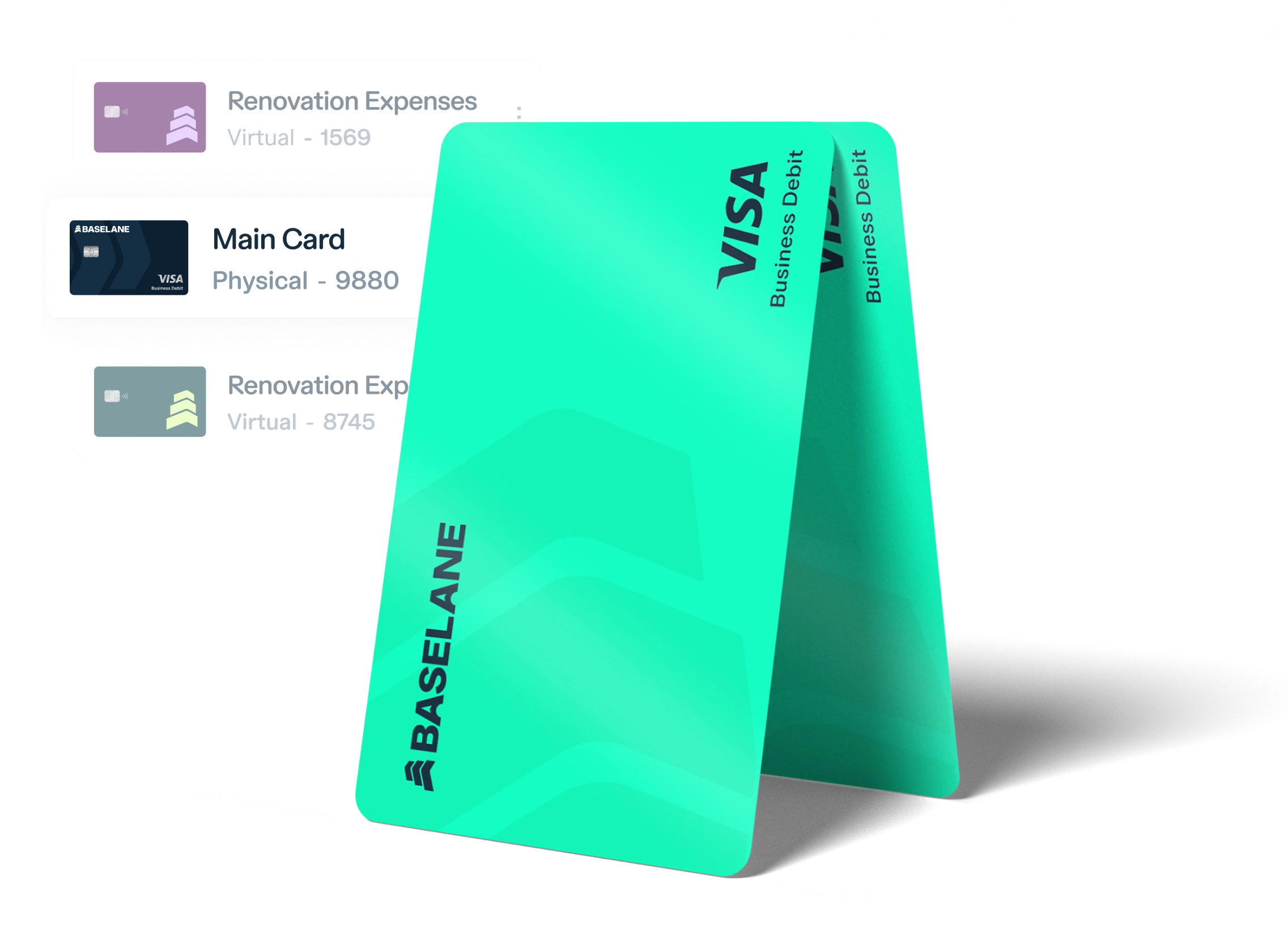As a real estate investor, managing rental property finances can feel like a complex puzzle. Modern online banking solutions, especially those offering instant virtual debit cards, are changing the game.
These tools provide landlords with enhanced security, streamlined expense tracking, and unparalleled convenience, empowering you to manage your portfolio with greater efficiency.
Key takeaways
Instant virtual debit cards offer unique digital card numbers for enhanced security and fraud protection.
They simplify expense tracking by allowing dedicated cards for properties or vendors.
Landlords can set granular spending limits and instantly pause or close virtual cards.
Online banking platforms like Baselane provide instant issuance, eliminating waits for physical cards.
Choosing the right provider means prioritizing security, flexible controls, and real estate-specific features.
What Are Instant Virtual Debit Cards?
An instant virtual debit card is a digital-only payment method generated with a unique card number, expiration date, and security code. Unlike a physical card, it exists solely online or within a digital wallet. You can often obtain these cards immediately upon account approval and linking a funding source, allowing for instant online and contactless payments.
It is crucial to distinguish true virtual cards from merely adding a physical card to a digital wallet like Apple Pay or Google Pay. A true virtual card has its own distinct card number, separate from any physical card. This separation offers greater control and security for your financial transactions.
Why every landlord needs instant virtual debit cards
For landlords, virtual debit cards address numerous pain points associated with traditional banking. They offer a modern solution to financial organization and security challenges inherent in property management. The benefits extend across various aspects of your real estate business.
Enhanced security and fraud protection
Virtual debit cards offer robust security against fraud and cloning. Their digital nature allows for instant lock or close capabilities if suspicious activity occurs. You can even generate single-use cards for one-time purchases, significantly reducing the risk of your primary account details being compromised. This layer of security is vital when managing multiple transactions across different properties and vendors.
Many virtual card providers support features like two-factor authentication, adding another barrier against unauthorized access. This proactive approach to security helps protect your rental income and investment capital. Such protective measures are paramount for any real estate investor.
Streamlined expense tracking and automated bookkeeping
Virtual cards revolutionize expense management by enabling specific cards to be assigned to properties or expense categories. This allows for automated bookkeeping, as each transaction is instantly tagged to its relevant purpose. For instance, you could have a dedicated virtual card for each rental unit, ensuring that all expenses for that property are clearly segregated.
This level of segregation vastly simplifies record-keeping and tax preparation. You gain a clear, real-time view of your property-level profitability. When considering how to manage your finances, understanding if multiple bank accounts good or bad can be beneficial for clarity. Virtual cards act as digital “checkbook dividers,” helping you organize funds within a single account.
Setting up multiple bank accounts for rentals or leveraging a bank account with multiple sub accounts becomes effortless with virtual card capabilities. This is true whether you operate as a sole proprietorship business bank account or have decided to open llc business account. For landlords seeking the best online business checking account, solutions offering integrated virtual cards are a distinct advantage.
Granular spending controls
One of the most powerful features of virtual cards for landlords is the ability to set specific spending limits. You can control exactly how much can be spent on a particular card within a given timeframe, or for a specific merchant. This level of control is invaluable when delegating purchasing authority to contractors or property managers.
You can instantly pause or close a virtual card if it is lost, stolen, or no longer needed. This immediate control prevents unauthorized spending or continued charges after a project is complete. Such flexibility ensures your financial resources are always utilized precisely as intended.
Instant access and unmatched convenience
Traditional banking often involves waiting days for a new physical debit card to arrive in the mail. Instant virtual debit cards eliminate this delay. Upon account approval, you can immediately generate and use these cards for online purchases or add them to digital wallets for contactless payments.
This instant access is particularly beneficial in real estate, where time-sensitive expenses often arise. Whether it is purchasing an emergency repair part or paying a vendor on the spot, virtual cards ensure you are never held back by physical card logistics.
The global virtual cards market, valued at $13.31 billion in 2022, is projected to expand significantly by 2030, indicating a strong trend towards these digital payment solutions.
Operational efficiency for multiple properties
Managing a portfolio of multiple rental properties demands efficient financial operations. Virtual cards allow landlords to create distinct payment channels for each property or specific types of expenses. This compartmentalization simplifies reconciliation and provides clear financial insights at a glance.
Imagine having a separate virtual card budget for each unit’s utilities, maintenance, or marketing expenses. This granular control makes it easier to track individual property performance and accurately assess profitability. The operational efficiency gained frees up valuable time, enabling you to focus on strategic growth rather than manual data entry.
Overcoming traditional banking hurdles for landlords
Traditional banking methods, while familiar, often present significant challenges for real estate investors. These hurdles can impede efficient financial management and obscure a clear view of your property’s performance. Understanding these limitations highlights why modern, virtual card-enabled solutions are becoming essential.
One common problem is the delayed issuance of physical cards. After opening a new account or requesting a replacement, landlords often face a waiting period, which can be disruptive for urgent property expenses. This delay can force reliance on personal funds or less organized payment methods, complicating expense tracking.
Another major hurdle is the difficulty in effectively segregating expenses across multiple properties using standard bank accounts. Without dedicated accounts or sophisticated internal tools, property-related transactions often blend together. This makes it challenging to pinpoint the profitability of individual units or accurately allocate costs.
The burden of manual record-keeping and reconciliation is also substantial with traditional banking. Landlords often spend countless hours manually categorizing transactions, matching receipts, and preparing data for tax season. This labor-intensive process is prone to errors and distracts from core property management activities.
Choosing the right virtual card provider for your rental business
Selecting the ideal online bank account with instant virtual debit cards requires careful consideration. Look beyond basic features to find a provider that truly supports the unique demands of your rental business. The right choice will streamline your financial operations and enhance security.
Reputation and robust security features
Prioritize providers with a strong reputation for financial security and data protection. Verify that they offer features like encryption, fraud monitoring, and secure login protocols. Your financial data for multiple properties requires the highest level of safeguarding.
Look for providers that offer single-use card options, merchant-locked cards, and instant card freezing capabilities. These features are crucial for preventing unauthorized access and mitigating potential fraud risks. A secure platform provides peace of mind for your real estate investments.
Comprehensive card controls and flexibility
An ideal provider offers granular control over your virtual cards. This includes the ability to set specific spending limits, expiration dates, and recurring limits. Flexibility in managing multiple virtual cards is essential for landlords with varied expenses.
The ability to easily pause, close, or reactivate cards at will is also a key feature. This adaptability allows you to respond quickly to changing spending needs or security concerns. Such controls are vital for maintaining tight oversight of your property finances.
User-Friendly Interface and Mobile Accessibility
A clean, intuitive user interface simplifies financial management, especially when dealing with multiple properties and transactions. The platform should be easy to navigate, allowing you to quickly issue new cards, track expenses, and manage settings. Mobile accessibility is equally important, enabling you to manage finances on the go.
Look for dedicated mobile apps that provide real-time notifications and full functionality from your smartphone or tablet. This ensures you can always stay on top of your property expenses, even when away from your desk. A seamless user experience saves valuable time and reduces frustration.
Transparent pricing and fee structures
Always review the fee structure carefully to avoid unexpected costs. Many online bank accounts and virtual card providers offer no monthly fees or transaction fees for basic services However, some may charge for premium features, foreign transactions, or excessive card issuance.
For landlords, focusing on no-fee options for core banking and virtual card services is often the most cost-effective approach. Transparency in fees allows you to budget effectively and maximize your returns. Ensure there are no hidden charges that could erode your rental income.
Real estate-specific features and integrations
While not all providers offer direct real estate integration, some are specifically built for landlords. Look for features that support property-level accounting, automated expense categorization, and tax reporting. Integration with property management software or accounting tools can further streamline your workflow.
These specialized features significantly reduce the manual effort involved in managing rental finances. They provide deeper insights into your portfolio’s performance, helping you make smarter investment decisions. Choosing a provider that understands the nuances of real estate investing can be a game-changer.
Baselane Tailored for Real Estate Investors
Baselane offers a banking platform built specifically for landlords and real estate investors. It provides unlimited virtual checking accounts, which can be used to manage expenses for individual properties or categories (Baselane.com via SerpScraper). You can also earn a high-yield Annual Percentage Yield on deposits, making your money work harder (Baselane.com via SerpScraper). FDIC insurance available for funds on deposit through Thread Bank, Member FDIC. Pass-through insurance coverage is subject to conditions.
Baselane’s virtual cards come with customizable controls and are integrated with automated expense categorization. This streamlines bookkeeping and provides real-time transaction enrichment for property-level insights (Baselane.com via SerpScraper). The platform aims to simplify financial management and maximize returns for landlords.
Relay Business Banking for Team Expense Management
Relay focuses on business banking solutions, offering up to 20 no-fee business checking accounts. It allows users to issue up to 50 virtual and physical debit cards, making it suitable for landlords managing teams or complex operations (Relay Blog, scraped content). You can also set online controls for these cards, enhancing expense management.
Relay provides automated, enriched transaction data to improve bookkeeping efficiency. This helps in keeping track of various expenses across different accounts (Relay Blog, scraped content). While not exclusively for landlords, its robust features make it a strong contender for those with multi-property portfolios.
Privacy Advanced Card Controls for Security
Privacy.com specializes in creating unique virtual card numbers for every online purchase. This offers enhanced security by masking your real debit card number, reducing the risk of data breaches and fraud (Privacy Card Blog). You can generate single-use cards or merchant-locked cards.
Privacy allows you to set spending limits and instantly pause or close cards, providing significant control over your expenditures (Privacy Card Blog). While not a full banking solution, it integrates with your existing bank account to issue virtual cards. It is an excellent choice for landlords prioritizing transaction security above all else.
Wise Global Payments and Digital Card Convenience
Wise (formerly TransferWise) is known for its international payment services and multi-currency accounts. It offers a digital card that can be issued instantly after account setup and topping up funds (Wise.com). This can be particularly useful for landlords who deal with international transactions or properties abroad.
Wise provides basic transaction tracking and allows users to set default or maximum spending limits on their digital cards. While it lacks specific real estate management features, its global reach and convenience for digital payments are notable (Wise.com). It serves as a versatile option for diverse financial needs.
Revolut Versatile Digital Money Management
Revolut offers a versatile digital money management app with instant virtual cards. You can get up to five multi-use virtual cards in the U.S. and one single-use card per day, providing flexibility for various payment needs (Neobanque via Perplexity Output). These cards require no activation and are ready for immediate use.
Revolut also allows cards to be frozen or unfrozen for security purposes, giving you control over your spending. While it offers basic transaction tracking, it is not designed with specific real estate features. It is a solid choice for general digital banking and convenient virtual card access.
Stessa Property Management with Integrated Banking
Stessa provides a property management platform that integrates banking features, including physical and virtual debit cards. These cards are designed to help landlords keep property-specific expenses separate, streamlining organization (Stessa.com via SerpScraper). This integration aims to simplify financial tracking for your rental properties.
Stessa’s banking features are tied into its property management tools, allowing for better expense categorization and reporting. Spending limits can be applied to the cards for controlled spending (Stessa.com via SerpScraper). It offers a comprehensive solution for landlords seeking integrated property management and banking.
When evaluating real estate banks, consider how well a provider’s virtual card capabilities align with your specific property management needs and financial goals.
Practical applications for virtual cards in your property management workflow
Virtual debit cards offer a wealth of practical applications for landlords, significantly enhancing the efficiency and security of your property management workflow. Integrating them into your daily operations can save time and prevent financial headaches.
Paying for property maintenance and repairs
You can assign a unique virtual card for each property’s maintenance budget. This allows you to easily track spending per unit and ensures funds are used only for their intended purpose. For example, a card could be dedicated to “123 Main Street Repairs,” with a set monthly limit.
This method also simplifies reconciliation for tax purposes, as all maintenance expenses for a specific property are clearly separated. It provides an immediate audit trail for every repair job. You can easily manage various vendors without commingling funds.
Managing vendor payments securely
When paying contractors, cleaners, or suppliers, you can generate single-use virtual cards for each transaction. This eliminates the need to share your primary banking details with multiple vendors, greatly reducing the risk of fraud. You can also set a precise spending limit for each vendor.
This approach gives you granular control over payments and ensures that vendors are only charged the agreed-upon amount. It adds a layer of security to all your business transactions. This is particularly useful for new or infrequent vendors.
Separating funds for capital reserves or security deposits
Virtual cards, when paired with sub-accounts or segregated digital accounts, can help manage various reserve funds. You can dedicate specific virtual accounts for cash reserve account funds or replacement reserves. This ensures that money for future large expenses is kept separate and accessible only for its designated purpose.
Similarly, you can use a virtual account to hold security deposits, especially if state laws require them to be in a separate, interest-bearing account. Understanding operating reserve real estate and interest reserve accounts can further optimize your financial structure. This approach brings clarity to your financial obligations.
You can also manage escrow reserve payment funds and even track hoa reserve funds more effectively. For community associations, selecting the right hoa banks with virtual card capabilities can provide similar benefits. This level of organization is crucial for long-term financial health.
Handling tenant-related expenses and reimbursements
For certain tenant-related expenses, such as utility payments that you manage on behalf of tenants, a dedicated virtual card can streamline tracking. If you need to reimburse a tenant for a pre-approved expense, a one-time virtual card payment can ensure the precise amount is sent securely.
This approach provides a clear record of all tenant-related financial transactions. It adds professionalism to your interactions and simplifies expense reconciliation. This can be especially helpful for unexpected costs.
Bottom line
Embracing online bank accounts with instant virtual debit cards represents a significant step forward for landlords seeking financial clarity and operational efficiency. These modern tools offer unparalleled security, precise expense tracking, and immediate access to funds, directly addressing many traditional banking pain points.
By providing granular control and simplifying bookkeeping, virtual cards empower you to manage your rental portfolio with greater confidence and less hassle.
For real estate investors, the future of banking lies in integrated, digital solutions that understand the unique demands of property management. Exploring options like Baselane, which offers unlimited virtual checking accounts and automated expense tagging, can transform how you manage your finances.
You can explore how these tools compare to the best business account for real estate agents or how they offer advanced checking account dividers for your properties. Consider how a dedicated platform can help you save time, gain clarity and control, and ultimately grow your passive income.
FAQs
Yes, many online banking platforms, including Baselane, offer instant virtual debit card issuance upon account approval. This allows for immediate use for online purchases or through digital wallets. You can often generate and use these cards within minutes of setting up your account.
Yes, virtual debit cards function as a digital extension of a linked bank account. They draw funds directly from your checking or savings account. This connection enables them to facilitate transactions while providing enhanced security and control features.
Yes, several online banking solutions offer no monthly fees for their core services, including instant virtual debit cards. Baselane, for example, provides unlimited virtual checking accounts with no fees as part of its core offering. Always review the specific fee structure of any provider.
Virtual debit cards offer high security for managing rental property finances. They feature unique card numbers, which protects your primary account details. Many allow single-use or merchant-locked cards, spending limits, and instant freezing/closing capabilities, significantly reducing fraud risk.








